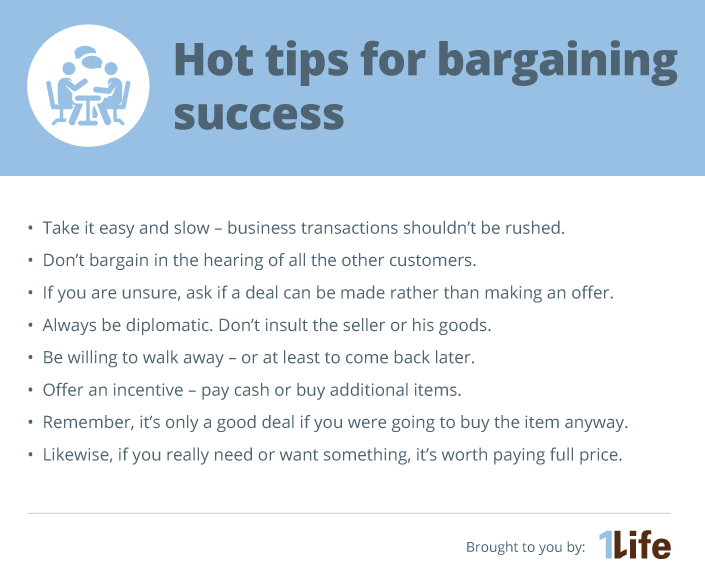If you’re of the opinion that bargaining is only for when you are shopping at beachside markets for curios, think again. There are plenty of times in your day-to-day life when you can negotiate for a better price on goods or services. If you can learn the art of the haggle, you can save yourself a great deal of money. These are some of the situations when it’s OK to try to strike a bargain:
When you’re buying a new carThere’s generally a bit of room for negotiation on a car’s purchase price – more so at second-hand dealerships, but also on new cars. The trick here is to do your homework. The dealer will likely know whether their car is well priced so don’t complain that “it’s expensive” when it isn’t. The best leverage you can have is a better deal elsewhere, so if you can show the seller that you’ve seen similar for less, they might bring their price down for you.
Sometimes you might not be able to get the dealer to come down, but they might be willing to throw in some extras.
When you’re paying for a medical consultation or procedureSome doctors, dentists and other medical practitioners have a regular rate and a special rate for medical aid patients. The medical aid rate is usually lower, but they might be willing to extend you the same deal if you ask nicely. Alternatively, some medical practitioners will give you a special rate if you are paying out of your own pocket, rather than claiming from a medical aid.
Either way, the best way to approach this is to make your request before the consultation or procedure – not once it is complete and billed – and be willing to offer some kind of compromise in return. Pay immediately to save the receptionist from having to chase you for fees or pay cash so that the doctor doesn’t have to pay a credit card service fee.
When you’re buying a houseIf you are buying a home, the seller expects some level of negotiation. That’s why you see statements like, “Asking R1 000 000, offers from R900 000”. Of course, if you love a home and the price is right, it’s best not to haggle on principle, because you might lose out to a more committed buyer.
To reduce the price, opt for one of two strategies. Either go much lower than you are willing to pay, so that the seller can counter-offer and you’ll hopefully meet in the middle. Or, name your best and final offer, which means that the seller must take it or leave it. This takes guts – or indifference – because you are then obliged to walk away if the seller doesn’t agree, or come back for another round of bargaining, even after the “final” offer.
When you’re selling a homeAs a home seller, you are also in a position to negotiate on your estate agent’s commission. A word of warning, though: if you try to negotiate your agent down by too much, you’ll be reducing their incentive to sell your property. The best time to negotiate with an agent is when they are presenting an offer that is below what you wanted, and they might be willing to reduce their commission to make the deal more appealing to you and to close the sale.
If you’re buying in bulk from an independently owned businessA chain store is unlikely to offer you any discount on marked prices, no matter how many of an item you are buying, but you might have better luck with a privately-owned business because their margins are in their own hands. Ask to speak to the owner or manager and explain how many you intend to buy and ask if they offer a discount for bulk purchases. You might be lucky.
A similar principle applies if you are buying clothes from a privately-owned boutique. Again, if you are spending a lot of money, the owner or manager might be willing to offer you a discount.
If you are buying second handSecond-hand shops and sellers are generally open to a deal because they aren’t working with standard items or pricing. Again, it’s a good idea to have a ballpark figure for what you are willing to pay for an item and negotiate accordingly.
The bottom lineNot every seller is open to negotiation, but it never hurts to ask. Be confident and pleasant, and willing to take no for an answer, and who knows, you might come away from the exchange with an excellent deal.




